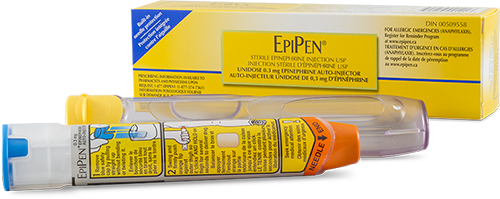Read our latest update regarding our meetings with McDonald’s® Canada, view our recorded webinar on stock epinephrine in public settings, check out our spotlight on Oral Immunotherapy (OIT), it’s a first article in an ongoing series we are doing on food allergy therapies, and learn about the latest research from Dr. Vadas on factors that may cause anaphylaxis.
McDonald’s: Our latest update on our advocacy efforts
 As you may know, we have been meeting with McDonald’s® Canada over the last few months to advocate on your behalf regarding the changes to their allergy-related policies they implemented earlier this year. Although we are currently awaiting a response from them on their next steps, including updated communications to the community, we wanted to share with you a quick update on our discussions with them.
As you may know, we have been meeting with McDonald’s® Canada over the last few months to advocate on your behalf regarding the changes to their allergy-related policies they implemented earlier this year. Although we are currently awaiting a response from them on their next steps, including updated communications to the community, we wanted to share with you a quick update on our discussions with them.
Our conversations with McDonald’s have centered around the following information and feedback on behalf of our community:
- The concerns and perspectives on these changes from individuals and families living with food allergies
- Impact of these changes for customers with food allergies, including the ‘halo’ community (e.g. schools, teams, friends/family, etc.)
- The importance of individuals with food allergies and those that support them as a significant consumer base, and why they need to be considered as an valuable and growing consumer segment
- Recommendations on ways they could update and/or implement specific processes and staff training for existing and future products to help minimize risks for individuals with food allergies
- Recommendations about ways they can clearly communicate their allergy management policies to help their customers with food allergies make an informed choice
We made a strong appeal to McDonald’s to continue their commitment and support to the allergy community, including considering the impact to the community when introducing major food allergens for potential new products.
We understand that this has been a long process and appreciate your patience as we continue to advocate on your behalf with McDonald’s on this very important issue. We hope to be able to send you a more comprehensive update by the end the month.
Recorded webinar: Stock epinephrine in public settings
 We hosted a webinar last month on the benefits and consideration for having stock epinephrine in public settings, particularly in foodservice settings. Stock epinephrine is an epinephrine auto-injector (e.g. EpiPen®) that is not prescribed to a specific person and can be used in an emergency.
We hosted a webinar last month on the benefits and consideration for having stock epinephrine in public settings, particularly in foodservice settings. Stock epinephrine is an epinephrine auto-injector (e.g. EpiPen®) that is not prescribed to a specific person and can be used in an emergency.
The webinar features presentations by both Dr. Susan Waserman, Allergist & Clinical Immunologist, McMaster University, and Bethan Dinning, Lawyer, Labour & Employment and Insurance & Tort Liability, Borden Ladner Gervais LLP.
Watch the recorded webinar in case you missed it, or want to watch it again.
Allergy Treatment Spotlight: Oral Immunotherapy (OIT)
This article is the first in an ongoing series we are going to feature on food allergy therapies. Our goal in this series is to provide an overview of the various forms of food allergy therapies currently being offered in North America, with a focus on Canada.
At the outset, it’s important to keep in mind that there is currently no cure for food allergy, and the treatments we will be looking at aren’t equally effective for all patients. It is also important to note that although there are allergists who offer OIT in the United States and Canada, this is not yet a standard treatment offered by allergists, and OIT is mainly conducted as part of clinical research trials. Nevertheless, these treatments hold promise for many, and have been life-changing for some.
This month, our focus is on Oral Immunotherapy (OIT). We had the pleasure of interviewing Tosha Freitag, RN, MN, research nurse, who works with Dr. Susan Waserman, Allergist & Clinical Immunologist at McMaster University.
Research Profile: Dr. Peter Vadas and his current research on the factors that may cause anaphylaxis
Dr. Peter Vadas is the Head of the Division of Allergy and Clinical Immunology at St. Michael’s Hospital, a teaching hospital affiliated with the University of Toronto. He is also a senior scientist at the Li Ka Shing Knowledge Institute and the Hospital for Sick Children Research Institute, in Toronto, focusing on identifying mechanisms and risk factors for severe and life-threatening anaphylaxis.
We recently spoke with him about his current research study looking at the causes of severe, near-fatal, or fatal anaphylaxis. In other words, looking at what the risk factors may be to cause a severe allergic reaction in someone.


